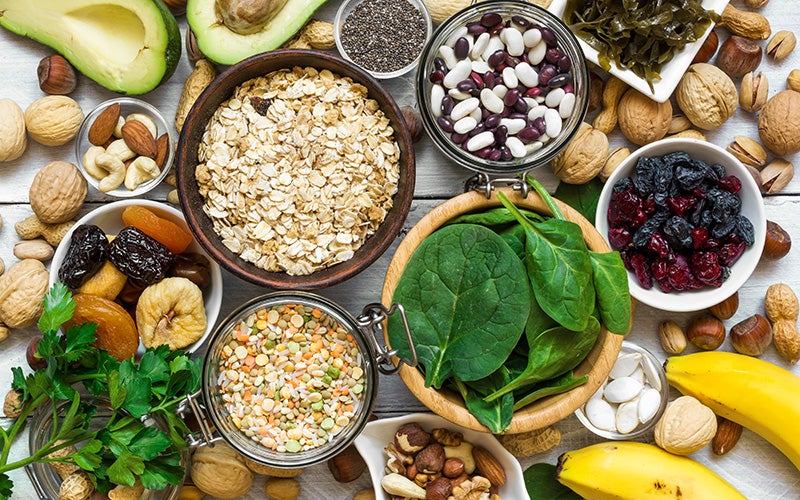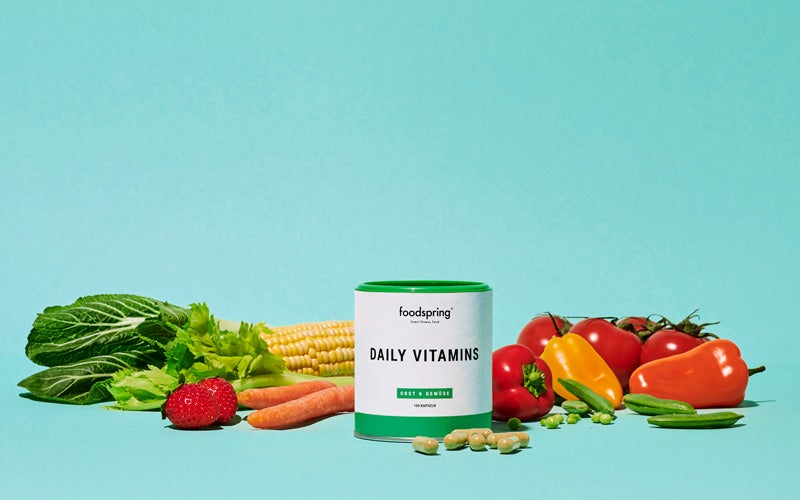Healthy Nutrition Made Easy
 ©samael334
©samael334
What is healthy eating?
A healthy diet is the basis for a healthy life. It promotes performance and well-being and gives the body what it needs. Many illnesses can be prevented with the proper diet. Since everyone is different and everyone has different nutritional requirements, there is no general recommendation for a healthy diet. The following tips will help you improve your diet and will have a huge impact on your physical health and performance.
Healthy nutrition for weight loss
Healthy eating is key not only for losing weight, but also for building muscle. Both of these goals are all about getting your calories in the right balance. Without the right calorie deficit (for weight loss) or surplus (for muscle gain), you won’t hit your goals.
Before you change your diet, try our free Body Check. Define your goals, calculate your BMI, and get nutrition and workout tips to fit your personal needs. It’s the perfect basis for your nutrition plan,
The German Nutrition Society has come up with rules to help you eat healthier. Based on these rules, here are our 10 tips to keep you on the right track every day.
| The benefits of plant-based foods: | The drawbacks of animal-based foods: |
| No cholesterol | Source of cholesterol |
| High in fiber | High in saturated fats |
| Source of minerals, vitamins, and phytochemicals | Source of purine (associated with a higher risk of gout) |
Your diet should therefore be primarily made up of plant-based foods. Animal-based foods should only make up a small proportion of the nutrition plan for a healthy diet. Fats, oils and foods containing a lot of sugar should be eaten very sparingly.
Healthy Breakfast – Start your day with a bang
Ever heard the saying: “Breakfast like a king, lunch like a prince, dine like a pauper?” There’s a logic behind it. A healthy breakfast is important so your body can start the day full of energy. Breakfast makes all the difference when you’re trying to change the shape of your body. A study showed that women who regularly ate a protein-rich breakfast were less likely to experience cravings during the day.
TIP 2: Eat foods that are as natural and unprocessed as possible
A healthy diet should consist of very few processed foods. Start by filling your shopping trolley with fresh foods.
Healthy alternatives to processed foods:
- Dried fruit instead of sweets
- Home-made dishes made from fresh ingredients rather than ready-made products
- Freshly squeezed juice instead of sugary supermarket products
Preparing your meals yourself allows you to control exactly what goes into them. The less pre-cooked or processed, the healthier they are. You should go for unprocessed alternatives like pure organic peanut butter without additives.
TIP 3: Cereal products & potatoes offer plenty of nutrients

©Karisssa
Cereal products and potatoes contain lots of vitamins, complex carbohydrates and minerals. When choosing grain products, you should go for wholegrain products, because these have the highest content of healthy ingredients. Rye and spelt are ideal.
Wholegrain products contain a lot of fiber, of which at least 30g should be consumed per day. Fiber promotes digestion, is filling and prevents diseases like diabetes. Wholegrain products should therefore be consumed several times a day, preferably in combination with low-fat ingredients. Those with a gluten-free diet can choose grains like millet, maize and buckwheat. Common grains like wheat, rye and spelt all have a high gluten content.
TIP 4: Five portions of fruit and vegetables a day
A healthy diet should include at least 3 portions of vegetables and 2 portions of fruit a day. They contain a large number of important vitamins and phytochemicals. Eat fresh or very briefly cooked to ensure that your body actually receives all these vitamins and minerals. Fruit and vegetables are the perfect side for your main meal. They can also be integrated into your nutrition plan as healthy snacks.
Tip: Try and eat a handful of fruit or vegetables with every meal. Eat your morning muesli with an apple or prepare some veggie sticks to have as snacks throughout the day. Home-made juices and smoothies are another delicious option.
Daily Vitamins – Cover 100% of your body’s daily needs
If you don’t get round to eating your five portions of fruit and veg, we recommend using our Daily Vitamins to supply your body with all the vitamins it needs.

TIP 5: Animal & dairy products in the right amounts
As a general rule, you should eat less animal products than plant products. They do have their place in a healthy diet, however, as they contain important minerals like calcium, iron and high-quality proteins.
Milk and dairy products should therefore be included in a healthy daily diet. Meat, sausages and eggs, on the other hand, should be consumed in moderation, as they contain a lot of fat, purines and cholesterol. Fish, with its high content of healthy fatty acids, should be on your meal plan 1-2 times a week.
Animal products that should be eaten in moderation:
- Low-fat milk and dairy products
- Fish
- Low-fat meats (e.g. poultry)
- Fatty sausages (e.g. salami)
- High-fat meats (e.g. pork)
- Bacon
The following applies to all animal products: low-fat is better. For vegetarians/vegans: You don’t eat animal products (at all), but need an easy option to supply your body with high-quality protein? Vegan Protein by foodspring is the perfect supplement for you.
TIP 6: Choose the right fats
Fats provide a lot of energy and promote obesity and cardiovascular disease. It is therefore particularly important to go for the right fats in a healthy diet. Plant fats and oils should be given preference. They deliver polyunsaturated fatty acids and omega 3 fatty acids, which the body cannot produce on its own. Trans fats should be avoided, however. These have a negative effect on blood lipid levels as a result of their chemical composition and are among the substances responsible for heart disease. They are mainly found in deep-fried products and ready-made foods. Beware of “hidden” fats, too: Confectionery, baked goods and ready-made products often contain more fat than you think. High-fat foods that support a healthy diet include avocados, nuts and fish.
TIP 7: Avoid sugar traps
Sugar and sugar-rich foods and beverages should only be consumed in small amounts. Sugar supplies so-called “empty” calories, because it contains very few nutrients. Sugar can also cause high fluctuations in blood sugar levels, which then promotes food cravings. Plant-based sweeteners like stevia are a good alternative to sugar in a healthy diet. Stevia contains no calories and does not raise blood sugar levels.
TIP 8: Stay hydrated
A sufficient intake of fluids is essential for your health and a healthy diet. You should drink at least 1.5 to 2 litres of water a day. Physically active people need at least 3 liters a day. Water and low-calorie, unsweetened drinks are the best option. A healthy diet means staying away from sugary sodas and alcohol as much as possible. Need more tips? Check out our article on dehydration here.
TIP 9: Gentle food prep
The way you prepare your food is also important for a healthy diet. A lot of nutrients are very sensitive to heat. That’s why food should be cooked for as little time as possible and at low temperatures, in a little fat or water. This protects the nutrients, prevents the formation of harmful compounds and also maintains the natural flavor.
TIP 10: Take your time and enjoy
A healthy meal rhythm is part of a healthy diet. Eating in a hurry often means that you eat more, because you don’t feel full until a few minutes later (thanks to leptin kicking in). So take your time with your meals, chew thoroughly and enjoy.
Healthy Eating Recipes
If you want to start eating healthy, it’s crucial to have an inspiring stash of recipes. Have a look at our entire collection of Fitness Recipes and see what catches your eye! We’ve got everything you need to keep you on track for the long term.
Sources for this article
We at foodspring use only high-quality sources, including peer-reviewed studies, to support the facts within our articles. Read our editorial policy to learn more about how we fact-check and keep our content accurate, reliable, and trustworthy.
- ¹ Deutsche Gesellschaft für Ernährung e.V., https://www.dge.de/ernaehrungspraxis/vollwertige-ernaehrung/10-regeln-der-dge/ [12.09.2020).

































